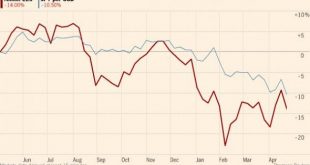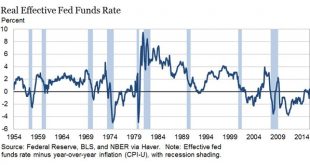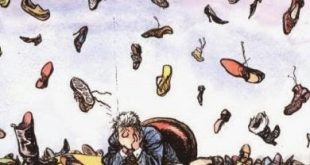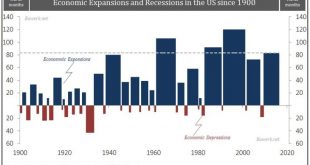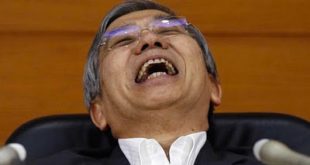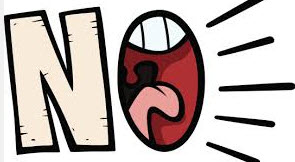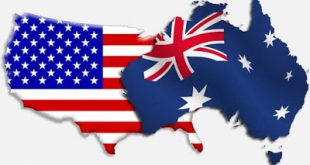You’ll have noticed that the yen and Nikkei were displeased yesterday. Like throw your toys out of the pram because you didn’t get what you wanted displeased. Like one of the worst one day JPY moves in the past decade displeased. What they didn’t get, and what prompted that tantrum, was any auld bit of easing from the Bank of Japan. And here are eight potential reasons why the BoJ disappointed, from SocGen: 1) there is a risk that the market may once again perceive limits to the...
Read More »Gold and Negative Interest Rates
The Inflation Illusion We hear more and more talk about the possibility of imposing negative interest rates in the US. In a recent article former Fed chairman Ben Bernanke asks what tools the Fed has left to support the economy and inter alia discusses the use of negative rates. We first have to define what we mean by negative interest rates. For nominal rates it’s simple. When the interest rate charged goes negative we have negative nominal rates. To get the real rate of interest we have...
Read More »Podcast Discussing Dollar, Fed, BOJ on Futures Radio Show
I had the privilege of being interviewed by Anthony Crudele, who is trader at the CME, for the Futures Radio Show. There was much to discuss. The FOMC met yesterday. The market, judging from the Fed funds futures see little chance of a June hike. Economists think otherwise. The Bank of Japan surprised many by not changing policy earlier today. The yen rallied. It seems counter-intuitive. The yen rallied when the BOJ surprised at the end of January when it the rate on some...
Read More »FX Daily April 28: What is the Next Shoe to Drop?
One can appreciate the frustration in Tokyo. The Bank of Japan surprised the world by adopting negative rates in January and the yen rallied. Today it disappointed many by not easing, and the yen rallied. The BOJ next meetings in mid-June and like this week, the outcome of its meeting will be announced the day after the FOMC meeting. There is some idea that BOJ may be waiting for Abe’s new fiscal package and the G7 meeting Japan hosts next month. The FOMC’s statement yesterday did not...
Read More »Central Banks Roil Markets
The Bank of Japan defied expectations and its economic assessment to leave policy unchanged. The inaction spurred a 3% rally in the yen and an even larger slump in stocks. The financial sector took its the hardest and dropped almost 6%. The yen's surge helped underpin other Asian currencies, especially the South Korean won, which gained nearly 1%. At the end of January, the BOJ surprised by adopting negative interest rates for a small part of Japanese banks' excess reserves. The yen...
Read More »Hillary Will be the Least of Your Worries – America has Economic Diarrhea
Economic Expansions and Recessions in the US since 1900 According to the National Bureau of Economic Research (NBER), the official recession arbiter, the US economy is currently at its fourth longest expansion in history. By the sheer nature of a capitalistic society with its inherent cyclicality it is a safe bet that a new economic recession will hit in the not too distant future. We have argued since June last year that the next recession is imminent and we now feel increasingly...
Read More »FOMC Statement Demonstrates Firm Grasp of the Obvious
The FOMC delivered a statement largely as expected. It upgraded its assessment of the global economy by dropping the reference to risks. It downgraded its assessment of the domestic economy by acknowledging that growth has slowed. Otherwise is general economic assessment remains little changed. The labor market continues to improve, though growth in household spending has slowed. Housing is stronger though fixed business investment and net exports have been soft (though not as soft as...
Read More »What is the BOJ Going to Do?
Under Kuroda’s leadership the BOJ has surprised the market a number of times, most recently with the move to negative rates at the end of January. It is not that such a move, which has been tried by several European central banks, was without merit. After all, growth and inflation prospects are not very encouraging. The Bank of Japan’s one mandate, to raise inflation pressures, has remains as elusive as ever. The BOJ has already pushed out the time that the inflation target will be...
Read More »With Tech Tanking, Can Anything Save The System?
Nice sentence: Tears won’t be confined to Wall Street however: let’s not forget that none other than the Swiss National Bank is also long some 10.4 million shares of AAPL. First it was the banks reporting horrendous numbers — largely, we were told, because of their exposure to recently-cratered energy companies. Now it’s Big Tech, which is a much harder thing to explain. The FAANGs (Facebook, Apple, Amazon, Netflix and Google) own their niches and not so long ago were expected to...
Read More »FX Daily April 27: Two Issues Loom Large Today: Soft Australia CPI and FOMC
The foreign exchange market is largely quiet as the market awaits fresh trading incentives and the FOMC statement later in the North American session. The main exception to the consolidative tone is the Australian dollar, which is posting its largest loss (~1.7%) in a couple of months. The short-term market was caught the wrong-footed when Australia reported an unexpected decline in Q1 CPI. The 0.2% decline contrasts to expectations for an increase of the same magnitude. The...
Read More » Swiss Economicblogs.org
Swiss Economicblogs.org

